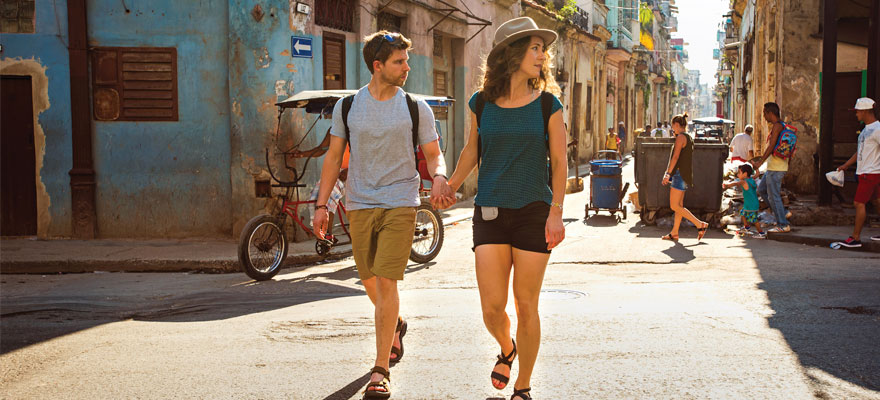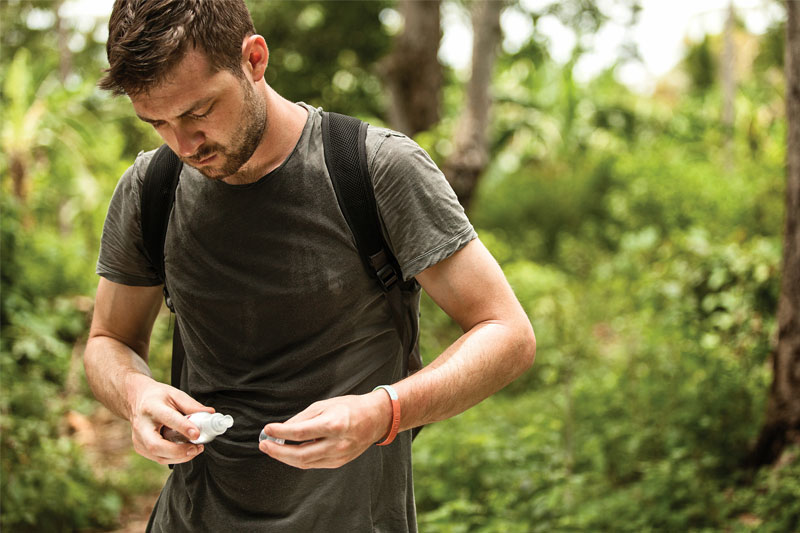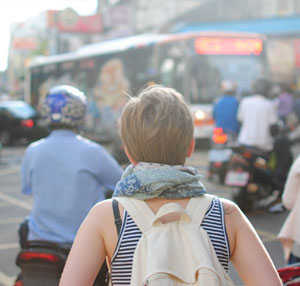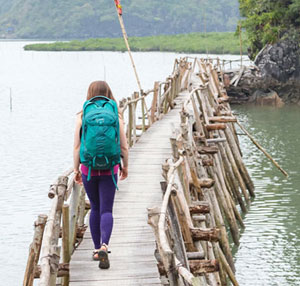Top 5 Travel Health Tips

Words and Photos: Lifesystems
When planning a trip, we research the countries, look for the cheapest deals on flights and accommodation, think how long we are going to stay there, what activities we are going to do and what to wear. But it is just as important to take steps to protect our health. It is important to know what disease risks are out there. They can be carried by food, water, insects, animals, and even by other people.
It is common for travellers to become ill while overseas, with the most common complaint being a bout of travellers’ diarrhoea. But there are other more serious, even life-threatening illnesses out there. We hope these top tips will help ensure you stay healthy while travelling:
1. Research your destinations
While planning your trip, research the disease risks relating to the areas you want to visit. Check if you need any certificates to prove you have had certain vaccinations when you enter the country, e.g. Yellow Fever. Look at the Visa entry requirements for each country you plan to visit; these may change closer to your time of travel but will give you a guide to what is required. Careful pre-planning is essential in safeguarding your health.
For up-to-date advice about local customs, religious holidays and laws, as well as guidance on visiting politically unstable areas, visit www.gov.uk/foreign-travel-advice. It is also worth subscribing to the Foreign and Commonwealth Office free email notification service. It will alert you to any updates and changes to the travel advice of the countries you plan to visit.
2. Talk to a travel health expert
As well as doing research, seek advice from an expert 6-8 weeks before you travel. Your GP may be able to provide this advice, or you may want to get your vaccine history from the GP and go to a private travel clinic. This professional needs to undertake a thorough risk assessment of your trip and offer any vaccinations and anti-malarial prophylaxis which you may need.
3. Include vaccines within your travel budget
Some vaccines are free at your GP, but others are not - for example, you will need to pay for anti-malarial tablets. Certain vaccines also require a course of injections, to ensure you are protected to a safe level. It is vital that you do not skip on protecting your health. It is much easier to do this in the UK, rather than having to go to a hospital abroad - probably cheaper and less stressful too!
4. Understand what medical facilities will be like at your destination
You need to be prepared for medical facilities which are not up to the standard of our own. The International Society of Travel Medicine global clinic directory can tell you the nearest reputable treatment centres for your destination, visit www.istm.org for more information.
5. Make sure you have appropriate travel insurance
Travel insurance is essential. In the case you become unwell or have an accident, it will cover the cost of medical care and pay for repatriation back to the UK if you become seriously ill. It is crucial that your insurance covers all the activities that you will be undertaking. So if you plan on doing a bungee jump, make sure this activity is covered! Your insurance will not be valid if you become ill or injured from anything not listed on your policy. At the time of writing, you can get an EHIC card to cover costs in Europe: it is free to apply for, through the NHS.
INSECT PROTECTION

Between 2000 and 2018, the number of cases of malaria per year fell globally by an astonishing 19 per cent. This translates to over 43 million lives which would otherwise have been affected by one of the world’s most persistent diseases. However, despite that drop the World Health Organisation reported an increase in malaria cases from 217m in 2016 to 219m in 2017. Add to that the equally mosquito-borne threats of yellow fever, dengue fever and the much publicised Zika virus, the bites of ticks, tsetse flies and fleas (amongst others) and you find many compelling reasons to take protective measures against such potentially hazardous insects. Fortunately, there are excellent ways to do this and all within easy reach of the average traveller.
The global drop in malarial infection was mostly attributed to the distribution of over a billion insecticide-treated mosquito nets across Africa. So make sure to sleep beneath one! Discuss suitable anti-malarial drugs with your GP, nurse or pharmacist - they will greatly help reduce the risk of contracting the disease. Mosquitoes tend to congregate in damp areas and particularly around standing water, bear this in mind on your travels.
Your clothes are the starting point for protection against biting insects. Wearing long, loose-fitting clothing that minimises your skin exposure is a basic precaution in high-risk areas. Any exposed skin should be lightly coated with an effective repellent. Historically the most effective mixtures have included DEET (diethyltoluamide), a potent chemical which intensely repels mosquitoes. Carry a balm with you to soothe the irritation of any bites you receive.
Make sure to check www.fitfortravel.nhs.uk for up to date information about the country to which you’re travelling.
TRAVEL SECURITY

To ensure safe, secure and stress free travel it typically pays to think of any potential problem and then work backwards. So, let’s think about all the various ways that your belongings could be compromised in transit.
Although most baggage handlers are sensitive, thoughtful human beings just like the rest of us; your bag is not going to be treated lightly. So make sure that everything inside it is well cushioned and packed to survive impacts from any direction.
Electronic theft of sensitive bank and passport data is unfortunately on the rise in this era of technology. Scanners are easily available and can be used at several metres from the target. It’s a smart move to invest in RFiD blocking cases or wallets which will help prevent the unauthorised reading of your data.
Unsecured zips may open accidentally whilst in transit; they may even be helped along in this process; so secure any zips or openings with a suitable lock.
Beyond luggage, it’s also key to ready yourself for any bureaucratic nightmares that can be sparked by loss or theft. Always keep your essential documents on your person or in your hand luggage. A body wallet which you wear under your clothes may help.
Make and separately store photocopies of your passport and travel insurance certificate. Write down essential numbers, such as those of the local British embassy, your insurance company’s helpline and your bank’s international contact number on a sheet of paper and keep it somewhere safe - perhaps under the lining of your shoe or in a money belt – and put all of this information on your phone.









